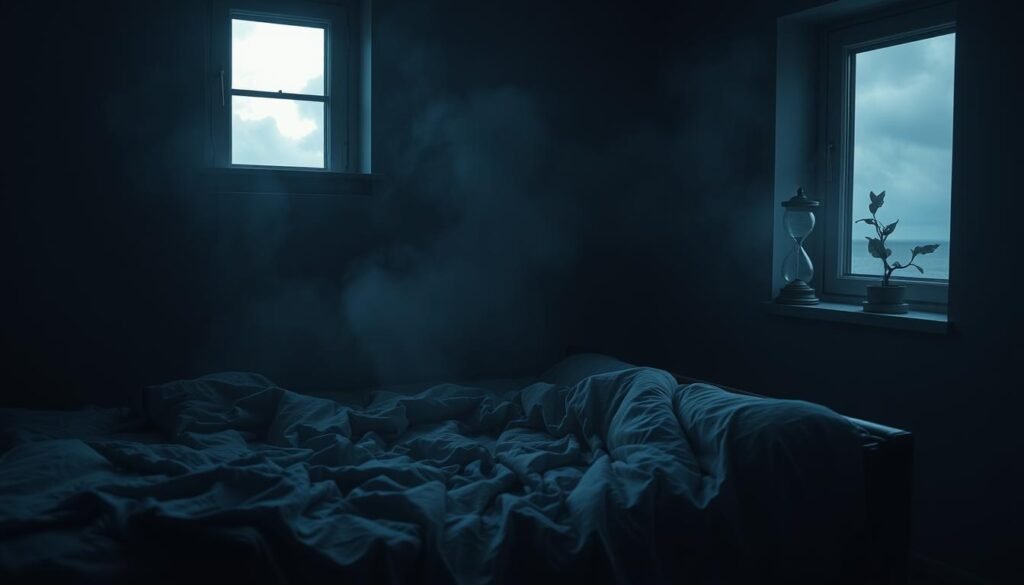About one in six people will face a major depressive episode during their life. This high number shows how much depression affects mental health. In the U.S. alone, up to 16 million adults battle clinical depression each year. Fatigue, which feels like extreme tiredness and lack of energy, often makes depression worse. This leads to a big drop in life quality.
Fatigue is not just being physically tired. It also involves your mind and feelings, deeply linked with depression. Many people with major depressive disorder (MDD) deal with ongoing fatigue. This makes it hard for them to get better. Health experts say focusing on fatigue when treating depression is key. It helps stop the depression from coming back and boosts how well people can do everyday things.
This piece looks at the main signs of fatigue from depression. It covers how these symptoms show up and their big impact on daily life.
Key Takeaways
- One in six people may experience a major depressive episode at some point in their lives.
- Fatigue is a significant symptom that complicates the recovery from depression.
- Addressing fatigue alongside depression can prevent relapse and improve quality of life.
- Understanding the physical, cognitive, and emotional aspects of fatigue is essential for managing depression.
- Persistent fatigue often remains after depression treatment, impacting daily functionality.
Introduction to Fatigue and Depression
Fatigue is more than just feeling tired, especially when paired with depression. It affects our bodies, minds, and emotions deeply. Depression is known as a mood disorder. It brings long-lasting sadness and a loss of interest in usual activities.
Over 90% of people with major depressive disorder feel very tired. Sleep problems are common, with 80% experiencing insomnia and about 35% sleeping too much. These sleep issues can increase emotional distress and make depression symptoms worse.
Lifestyle choices can affect the link between fatigue and depression. Eating a lot of inflammatory foods may make depression symptoms stronger. On the other hand, practicing mindfulness through yoga or tai chi can help. For more severe symptoms, treatments like transcranial magnetic stimulation (TMS) are useful.
Knowing how fatigue and depression are connected helps us recognize and tackle these issues. It leads to better mental health and a higher quality of life.
What is Fatigue?
Fatigue is a common condition that many people don’t fully understand. It affects millions worldwide, especially those with Major Depressive Disorder (MDD). It’s a deep feeling of tiredness that affects your body, mind, and emotions. This exhaustion can significantly disrupt daily activities and overall quality of life. It’s crucial to identify and understand fatigue’s different aspects for proper treatment.
Defining Fatigue in Clinical Terms
Fatigue in clinical settings is more than just feeling tired. It’s described as an overwhelming sense of energy loss and a lack of motivation. This is according to the DSM-IV’s definition. For people with MDD, fatigue is a common symptom. Studies show that up to 90 percent feel intense fatigue, even when they are on antidepressants. This fact underscores the need to treat fatigue as a complex issue, not just a part of depression.
Physical, Cognitive, and Emotional Aspects of Fatigue
Understanding fatigue requires looking at its three main dimensions:
- Physical Fatigue: This type shows up as a lack of energy, diminished endurance, and feelings of being worn out. It can make daily activities hard to do.
- Cognitive Fatigue: People may find it hard to focus, remember things, or think quickly. This makes work and socializing challenging.
- Emotional Fatigue: It involves intense feelings of emotional strain, disinterest, and a lack of motivation. These feelings can make depressive symptoms worse.
Those dealing with leftover fatigue are more likely to have recurring depression. Using tools like the Fatigue Questionnaire or the Massachusetts General Hospital Cognitive and Physical Functioning Questionnaire helps measure fatigue levels. Knowing about fatigue’s different aspects is key for effective treatment, especially for depression management.
Understanding Depression
Depression is a common mental illness in the U.S., touching millions. It comes in various forms, all with unique signs but some shared aspects. Learning about these types helps us see how depression affects people differently.
Different Types of Depression
There are many types of depression, such as:
- Major Depressive Disorder: A severe form that significantly disrupts daily life.
- Persistent Depressive Disorder: A chronic state of depression lasting for at least two years.
- Seasonal Affective Disorder: Depression that occurs at specific times of the year, often linked to reduced sunlight in winter.
- Premenstrual Dysphoric Disorder: Severe mood swings in the weeks leading up to menstruation.
- Substance-Induced Mood Disorder: Depression triggered by substance abuse.
Different types show unique features, revealing how depression varies among people. Teens and young adults are often affected in distinctive ways.
Common Symptoms of Depression
To support someone, knowing the symptoms is key. The common ones include:
- Profound sadness or emptiness.
- Fatigue or lack of motivation.
- Irritability or frustration.
- Changes in sleep patterns and appetite.
- Cognitive issues such as difficulties in focus and decision-making.
Many also feel worthless or overly guilty. Spotting these signs is vital since about 75% say their symptoms disrupt daily life. The symptoms can differ by age, with teens showing withdrawal, academic struggles, and risky behavior as signs of depression.
Fatigue and Depression: The Connection
Fatigue and depression are closely linked, causing problems for many people. Fatigue is common in those with depression. It makes them feel even more drained and upset. To get better, it’s important to understand how fatigue shows up in depression.
How Fatigue Manifests in Depressive Disorders
Most people with major depression feel very tired. This tiredness makes depression worse, affecting both feelings and health costs. Not sleeping well, which happens to about 80% of depressed people, adds to this tiredness. Getting regular exercise, even just a little each day, can help fight this exhaustion.
The Role of Neurotransmitters in Fatigue and Depression
Our brains use chemicals like serotonin and norepinephrine to control our mood and energy. When these chemicals are off-balance, we may feel more tired and more depressed. Some medicine for depression might make tiredness worse. It’s key to treat both the tiredness and depression to feel better.

Key Signs of Fatigue in Depressive Disorders
It’s vital to know the key signs of fatigue in depression for proper treatment. People with depression often feel very tired, impacting their day-to-day life. Spotting these signs helps in getting the right support to improve well-being.
Physical Symptoms of Fatigue
Physical signs include feeling weak and having no energy for everyday tasks. People may feel very sleepy, have a low mood, and suffer from headaches. These physical symptoms make it hard to do daily activities and enjoy hobbies. Checking symptoms through resources like this link can help find ways to manage them effectively.
Cognitive Symptoms of Fatigue
Cognitive issues involve problems with concentration, memory, and thinking speed. Those with depression find it hard to stay focused, leading to frustration and feelings of inadequacy. This mental tiredness shows how mental health affects energy, making people more exhausted.
Emotional Symptoms of Fatigue
Emotional signs often mean less motivation and feeling overwhelmed. Many also feel irritable and sad, affecting their daily life and interactions with others. Recognizing these emotional symptoms matters because they greatly influence life choices and relationships. Taking steps like exercising and seeking help can help regain energy and emotional health.
| Type of Symptoms | Examples |
|---|---|
| Physical Symptoms | Weakness, increased sleepiness, chronic low mood, body aches |
| Cognitive Symptoms | Trouble concentrating, memory impairment, slow thought processes |
| Emotional Symptoms | Diminished motivation, feelings of overwhelm, irritability |
Impact of Fatigue on Daily Life
Fatigue deeply affects our lives, touching work, friends, and how we feel inside. Knowing these effects shows how big and disruptive fatigue really is day-to-day.
Effects on Work and Productivity
Fatigue often makes us less productive at work, leading to more skipped days and lower quality work. Around 10–20% talk to their doctor about feeling tired, showing its big role. This tiredness can make meeting job demands hard, hurting performance.
Influence on Social Relationships
Being tired can make us less social and skip fun activities. This can make us feel alone, worsening the tiredness cycle and hurting our social life. For instance, one-third of teens feel tired most of the week. This may stop them from hanging out with friends or going to events.
Consequences for Mental Health
Feeling perpetually tired is bad for our mental health, worsening conditions like depression. It’s a factor in 18.5% of long-term fatigue cases. Chronic tiredness, lasting over six months, can lead to anxiety and depression. With 24% of adults in the US feeling this way for two weeks or more, it’s important to find the root causes to feel better.

| Factor | Impact on Daily Life |
|---|---|
| Work Productivity | Decreased output and increased absenteeism |
| Social Relationships | Withdrawal leading to isolation |
| Mental Health | Exacerbation of anxiety and depression |
Identifying Residual Fatigue in Treated Depression
Even after treating depression, some people still feel very tired. This kind of tiredness is called residual fatigue. Research shows that about one-third of those with major depressive disorder say they’re still tired after treatment. Knowing about these symptoms can help doctors find better ways to help.
Prevalence of Residual Symptoms Post-Treatment
After 16 weeks of treatment, 61% of patients did not show depression symptoms. But, 44% of these people still felt tired. Loss of energy was reported by 57% of these patients. These numbers show that feeling tired after treatment is common and needs more attention.
Assessment Tools for Fatigue in Depression
Doctors use special tools to check how tired patients feel. Tools like the Massachusetts General Hospital Antidepressant Treatment Response Questionnaire and the Fatigue Questionnaire are important. They help tell the difference between different kinds of tiredness. Quick detection and treatment can really help improve someone’s life.
Common Medications Associated with Fatigue
Fatigue is a common side effect of many common medications. It’s important for both patients and doctors to know this. Drugs like some antidepressants can make you very tired. This includes tricyclic antidepressants such as amitriptyline and doxepin.
Even selective serotonin reuptake inhibitors (SSRIs) might lead to feeling very tired in some people.
- Antihistamines: Brompheniramine, diphenhydramine, hydroxyzine, meclizine
- Anxiety Medications: Benzodiazepines such as alprazolam, clonazepam, and diazepam
- Blood Pressure Medications: Beta-blockers like atenolol and propranolol can make you feel slow and tired
- Opioid Pain Medications: Fentanyl and morphine can make you sleepy
- Muscle Relaxants: Cyclobenzaprine may cause you to feel sleepy and tired
These common medications can affect brain chemicals that control sleep and wakefulness. Because of this, treatment might need to be adjusted. Sometimes, a change in therapy or dosage can help reduce tiredness.
If medication makes you tired, try some strategies to feel better. These can include regular physical activity, doing deep breathing exercises, or changing when you take your meds. Talking to your doctor about non-drowsy medication options can also help improve your energy.
Knowing that different drugs can cause tiredness is key. It encourages patients to talk about their tiredness with their doctors. Better management of tiredness can really improve life quality, especially for those being treated for depression or any other condition.
Learn more about medications that can cause chronic fatigue here
Treating Fatigue in Depression
To address fatigue in depression, a broad approach is needed. This includes therapy, lifestyle adjustments, and medications. By understanding these areas, one can tackle both depression and its tiring effects.
Therapies and Lifestyle Changes
Lifestyle modifications are key in fighting fatigue. Setting a regular sleep schedule boosts energy. A little exercise, like a 20-minute walk daily, also fights fatigue and helps with depression. Eating better is crucial; research shows improving your diet lessens depression. Choosing whole foods over processed ones supports your mental well-being too.
Medications That May Help
Medications can be critical for treating depression-related fatigue. Psychostimulants and bupropion work better at reducing fatigue than traditional SSRIs do. Medicines like noradrenergic reuptake inhibitors and atomoxetine may also be effective. For deeper insights, check out studies on fatigue and depression and research on how lifestyle changes combat these symptoms.
| Strategy | Description | Impact on Fatigue |
|---|---|---|
| Lifestyle Changes | Establishing sleep routines, engaging in physical activity, and a balanced diet. | Significantly reduces fatigue levels and improves mental health. |
| Medications | Use of psychostimulants, bupropion, and non-sedating antidepressants. | Provides relief from residual fatigue. |
| Therapeutic Approaches | Cognitive behavioral therapy to build coping strategies. | Empowers individuals to manage symptoms effectively. |
When to Seek Help for Fatigue and Depression
Knowing when to seek help for fatigue and depression is very important. It can make a big difference in getting better. It’s key to notice symptoms like being very tired all the time, feeling emotionally upset, or not being able to do everyday tasks. If you feel hopeless often, it means you should look for professional help. Getting help early can improve your mental health and make life better.
Recognizing the Need for Professional Support
If you’re feeling tired and also having a hard time emotionally, it could be a sign of something more. Here are signs it’s time to think about professional help:
- Prolonged emotional distress affecting daily life
- Inability to carry out routine activities such as work or social interactions
- Persistent feelings of hopelessness or worthlessness
- Changes in appetite or sleep patterns
- Heightened feelings of anxiety or restlessness
Available Treatment Options
There are many ways to treat fatigue and depression. They can help you feel more in control and happier:
| Treatment Option | Description |
|---|---|
| Psychotherapy | A therapeutic approach that can involve individual or group sessions to discuss feelings and emotions. |
| Medication Management | Prescription of antidepressants that may alleviate symptoms of depression and fatigue. |
| Support Groups | Community sessions providing shared experiences, encouragement, and motivation. |
| Intensive Outpatient Programs (IOP) | Structured treatment that allows individuals to receive care while maintaining daily responsibilities. |
| Nutritional Counseling | Guidance on dietary changes that can improve both physical and mental health. |

Low to moderate exercise, like a 20-minute walk, can help with symptoms too. Knowing the different treatment options shows why it’s key to get help for fatigue and depression.
Recent Research on Fatigue and Depression
Latest studies show a complex link between fatigue and depression. They find that many people with depression also feel very tired. This makes finding good treatments even more important. People in these studies also shared that being lonely made their depression, pain, and tiredness worse.
Studies Highlighting the Link
A key study found that loneliness can lead to more fatigue and depression over time. This was true for cancer survivors and older adults taking care of sick spouses. For example, a study looked at cancer survivors and people without cancer. They found that feeling lonely was linked to feeling more tired and depressed. Most of these people were White women around 56 years old.
Other research shows that many with Major Depressive Disorder (MDD) often feel very tired. Surprisingly, even when their depression gets a bit better, the exhaustion doesn’t always go away. In one group of 66 MDD patients, 90% felt extremely tired even though most were on antidepressants. Drugs called SSRIs and SNRIs were commonly used.
Future Directions for Research
Soon, research will aim at finding better ways to treat both fatigue and depression at the same time. This is important because fatigue can stick around even when depression starts to improve. Tools like the Massachusetts General Hospital Questionnaire are vital for spotting fatigue. More studies will help find the best drugs, like bupropion, to treat both issues.
Conclusion
It’s vital to understand how fatigue and depression affect each other, to improve mental health. Depression impacts over 168 million people globally. It’s a major source of health problems. Recognizing fatigue as crucial in depression is key.
Targeted support and therapy can help manage these conditions that often worsen together. This is because fatigue and depression frequently occur together and make each other worse.
Research highlights fatigue’s severity, especially with chronic diseases like cancer and multiple sclerosis. For instances, 69% of those with multiple sclerosis say fatigue is one of their worst symptoms. Therefore, handling both fatigue and depression can enhance life quality.
Also, body inflammation could predict the severity of fatigue and depression. This points to the need for treatments that cover both issues.
Adopting comprehensive approaches is essential. These can include lifestyle changes, therapies, and suitable treatments. This way, those facing fatigue and depression can overcome these challenges better.
Adequate support and correct treatment options can indeed help improve emotional health. They enable individuals to enjoy life more, despite the struggles with fatigue and depression.